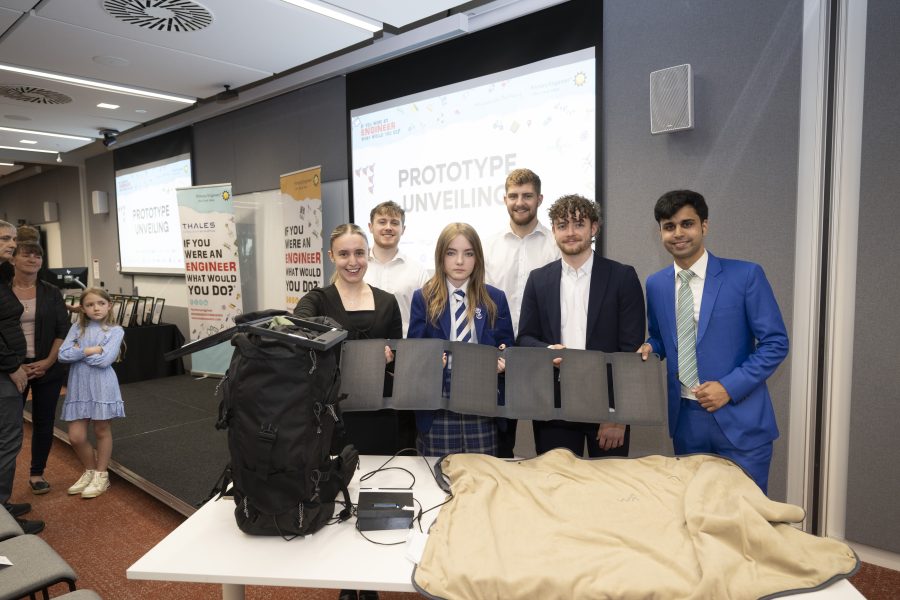
Thales Glasgow have turned P7 Pupil Rebecca’s Solar Powered Heated Blanket into a reality
Introduction to the partnership
Thales are one of our National Partners for our annual engineering competition which asks pupils aged 3-19 ‘If you were an engineer what would you do?’ and encourages pupils come up with creative solutions to real-world problems.
There are 5 Thales teams from various sites around the UK who will each be working on one of the 5 pupil engineering ideas selected to develop into a prototype over the 2023/2024 academic year which will be unveiled at the Awards Ceremony and Public Exhibition during the Summer term.
The prototeam
The Solar Powered Heated Blanket was chosen by Thales Glasgow because the pupil had highlighted an interesting gap in the market for a portable style heated blanket that’s able to be operated using solar energy and not rely on mains. The team liked that the student’s design intent was to help the homeless, and they also recognised this idea’s applicability in camping, hiking and travelling applications.
The prototype team is formed of a mixture of graduates and apprentices, from various disciplines.

Beginning the prototype
They identified that the design comprised of three main components which were a heated sleeping bag/blanket, a set of solar panels and a battery pack. They used the average human sleep time of 8 hours as the required run time of the heated sleeping bag in initial power calculations and kept this in mind when researching suitable batteries and solar panels.
They were quite keen on adding further elements to this design in an effort to make it more efficient and targeted towards the end user. So, they decided to include a control circuit that would automatically alternate the blanket between on/off states based of sensor temperature readings, aiming to boost battery life. The team also modelled a bag with an outer frame customisation to hold the solar panels, this allows for on-the-move solar charging whilst also providing the user with storage space.

Progress of the build
All of the required components and sub components were acquired and tested to make sure they meet the requirements.

Control circuit was tested on a breadboard and components were soldiered onto a circuit board after performance verification.
Parts comprising the bag’s outer frame were modelled in CAD software and their STL files were sent to the 3D printer.
The team then modelled a casing for the final control circuit, 3D printed it and attached it to the heated sleeping bag. Assembled the frame parts together, fixed it onto the backpack and attached the solar panels to it. Then they connected all of the sub-components together and carried out system level testing.
School visit

The team delivered a presentation to Rebecca’s class about engineering in general and at Thales. They demonstrated and let the class test out Sophie lite camera and it’s thermal imaging mode. They caught up with the student Rebecca and her teacher to update them on the progress and allow Rebecca to assess the protobuild.
She was very happy to see her idea has been brought to life and gave her tick of approval. She was happy with the heated blanket being a ‘heated sleeping bag’ as it would allow for better heat retention.
Prototype unveiled!
The prototype was unveiled at the South East awards on 24th May hosted at Glasgow University. Huge well done to the Thales UK Glasgow Prototeam.

